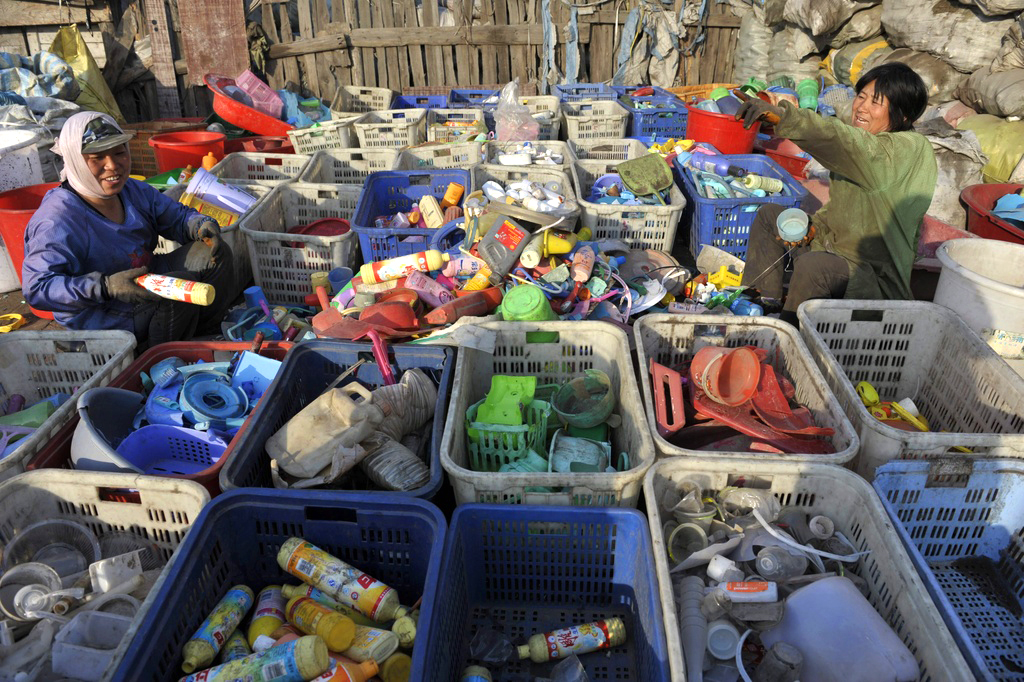Room to grow in Swiss plastic recycling

Switzerland’s recycling figures for plastic drink bottles are at an all-time high, but there is no nationwide system for recycling other types of plastic.
The exception is opaque white milk containers, which retailers normally take back along with the omnipresent PET beverage bottles. Packaging for food, cosmetics and other everyday products generally lands in the incinerator.
“In Switzerland the guiding principle is that we only collect plastics when there’s a clear ecological benefit and when it is affordable to do so,” said Susan Glättli of the Federal Environment Office.
“The recycled material is of a very good quality and it’s possible to make new products like food packaging.”
Glättli told swissinfo.ch it is more practical for other plastics to feed the fires of local incinerators. Since 2000, it has been illegal to throw combustible or chemically unstable garbage into Swiss landfills.
“All waste is incinerated and so the plastics are contributing mainly to this energy recovery. As long as plastic products are not easily collectable and recyclable, they are used to produce energy,” said Glättli.
Pilot programmes
Meanwhile, some Swiss communities are making a special effort to recycle a broader range of plastics.
The city of Zug has been collecting plastic for several years now. For a while, it experimented with charging residents SFr1.90 ($1.81) for a 40-litre bag to fill with old shampoo bottles and other plastic waste.
That was cheaper than the standard rate for disposing of rubbish; like many Swiss cities and towns, Zug requires people to pay a fee for each bag of garbage.
However, the pay-to-recycle system never really caught on. So now people can drop off their mixed plastic waste for free. An attendant checks its quality before adding to the pile, which ultimately goes to PlastOil, a local company that makes oil with it.
“It’s still a pilot project; whether it really is the way to go is an answer that shall be generated in the future – but if we don’t do anything, nothing happens,” Hans Schwarzenbach, director of the Zug Ökihof recycling centre told swissinfo.ch.
In 2009, the people of Zug provided PlastOil with 256 tonnes of plastic waste – or ten kilos per person. PlastOil won canton Zug’s Innovation Prize in 2006.
The nation’s capital has been collecting assorted plastics since 2005. Currently, Bern residents can deposit their plastic waste at eight drop-off points. In 2009, the city gathered about 250 tonnes of plastic, as city employee Cornelia Kissling told swissinfo.ch.
“We are in talks with a variety of businesses that would like to recycle the plastic,” said Kissling.
With the fluctuating market prices for old plastic, it is not always easy for recycling businesses to turn a profit.
Research needed
A new government-funded study is looking into more ways for Swiss businesses and consumers to recycle plastic.
Redilo, a firm specialising in sustainable resource concepts, is leading the project. According to managing partner Raymond Schelker, there are a number of questions to be answered.
“Where is there still potential and what can we achieve? What can be recycled and how can it be collected? Does it make sense ecologically and economically? We’re looking to see what’s being done already, for example in other countries,” Schelker told swissinfo.ch.
He noted, “There’s no standard solution or system… at the moment it’s a bit of a jumble. With our study we hope to get some more insight.”
In addition to household waste, the project covers industrial items like plastic barrels as well as the plastic sheeting from industry and that farmers wrap around silage balls. As Glättli mentioned, a fee on these bulky items could help fund recycling programmes.
Schelker said he was pleased that Redilo had managed to get all the key players at the table, including the federal and local governments, recycling companies, incinerator operators and the cement industry, which can use the plastic in manufacturing.
“We’re very optimistic that with this project we can make an important contribution to more plastics being recycled in Switzerland in the future,” said Schelker.
Schwarzenbach is also convinced of the value of such a project.
“We cannot improve recycling and reduce the necessary number of incineration plants if we don’t make some public effort to generate new ways of recycling.”
PET stands for polyethylene terephthalate, a plastic resin and a form of polyester.
With an 81% return rate in 2009, PET recycling is a success in Switzerland.
That’s an increase of 3%compared with 2008, according to the Swiss PET Recycling association. The national target was 75%.
The motivation is there – a drop below 75% would mean a return to a system of deposits being charged on beverage containers.
However, there is still room for improvement.
While 37,543 tonnes of PET bottles were recycled, another 8,806 tonnes either landed in an incinerator or ended up littering the landscape.
There are over 29,000 PET collection points across Switzerland, or roughly one for every 250 people.
Recycled PET can be converted into new PET containers. It is also used for items like carpeting, clothing, athletic shoes and luggage.
The recycling rate for glass and aluminium is considerably higher than that for PET.
In both 2008 and 2009, the Swiss recycled 95% of their glass bottles and jars.
They also were consistent in recycling aluminium cans, with 91% return rate in both years, according to the Federal Environment Office.

In compliance with the JTI standards
More: SWI swissinfo.ch certified by the Journalism Trust Initiative















You can find an overview of ongoing debates with our journalists here . Please join us!
If you want to start a conversation about a topic raised in this article or want to report factual errors, email us at english@swissinfo.ch.